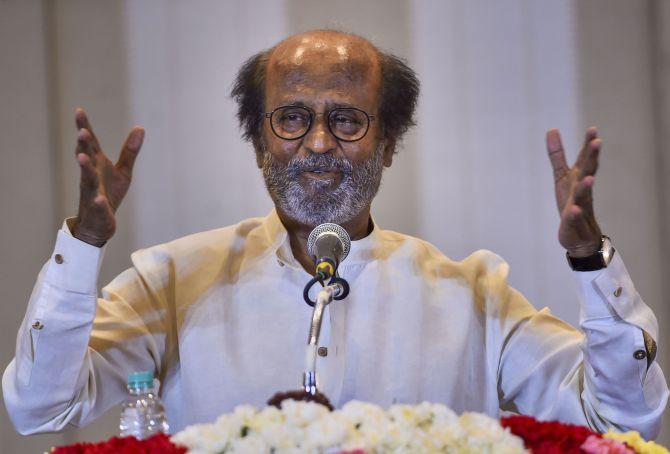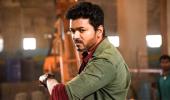Will Vijay will go the most successful MGR/Jayalalithaa way, or that of Vijayakanth, Seeman or Kamalahaasan, or end up as another Rajinikanth who cries wolf at the last minute and quits the scene even before it all had really begun, asks N Sathiya Moorthy.

If anyone thought that by announcing his entry into electoral politics with a new political party, Vijay, the highest-paid Tamil film actor, whom his Hindutva detractors refer by his full name 'Joseph Vijay', if only to drive home his perceived religious affinity as a Christian convert, was setting the Kaveri, Vaigai, Palar and Thambiraparani, not to leave out other sacred rivers across southern Tamil Nadu on fire, his initial announcement has met only with limited enthusiasm, confined mostly to his fan clubs, without transcending as yet to cover the huge fan base.
Of course, Vijay has set himself a two-year time for transition, for his new party to contest elections -- and capture power -- in Tamil Nadu through the assembly elections due in 2026.
Though the unspoken commitment is that he would replace the multiple 'Kazhagams' with a common 'Dravida' prefix, his own party has a 'Kazhagam' for its suffix.
Vijay has now made it clear that his Tamizhaga Vetri Kazhagam (TVK) will not contest this year's Lok Sabha polls nor would it support any political party or candidate -- a commitment that would be tested on the ground, as across the state, rival political parties will be watching his fans-turned-party cadres to see their campaign-time association with party leaders and candidates, even if remotely and discreetly.
In a signed statement, Vijay reiterated his commitment to 'fundamental political change' with transparent, caste-free, and corruption-free administration. It is the kind of government he had promised in his 2018 cinematic outing Sarkar, in which a ruthless NRI 'business monster' Sundar launches a legal fight to have his impersonated vote restored, then goes on to challenge the status quoist polity through the electoral process -- with a few twists, turns, stunts and dances thrown in between for silver screen effect.
Of course, Vijay, or 'Thalapathy' Vijay, as he is known after, yes, 'superstar' Rajinikanth's Mani Ratnam directorial of the same name, released in 1991, knows pretty well that reel life and real life are different.
Vijay's fans had borrowed/hijacked the title, meaning 'commander' in English, but only after Rajini fans had promoted him to be their 'Thalaivar', or 'leader', especially after the latter had indicated his interest and willingness to enter direct politics but did not actually do so, despite multiple false-starts almost to the very end.

Vijay thus does not obviously want to be compared with Rajini, hence the quick decision to make a political party out of his fans club that had converted into 'Vijay Makkal Iyakkam', a people's welfare body in 2009, like those of other actors like Rajinikanth and Kamal Haasan, who are known even more for conducting blood-donation camps or otherwise making the required group of blood available to hospitals and patients even in remote villages.
The Makkal Iyakkam registered itself as an NGO a couple of years ago and has been involved in constituency-specific welfare measures, addressing especially students and other youth, from which segment the actor's fans invariably come from. Every one of those events, all of which went on for hours, did attract huge crowds that also stayed put.
For at least a year now, rumours and reports have been doing the rounds about Vijay's imminent entry into politics. However, those reports did not set anything on fire, especially in the light of Rajinikanth's U-turn ahead of the 2021 assembly polls, the not-so-successful electoral career of Kamalahaasan with his Makkal Needhi Maiiyam (MNM) and Seeman's Naam Tamizhar Katchi (NTK), not to leave out the poll-slide of the late Vijayakanth and his Desiya Murpokku Dravidar Kazhagam (DMDK).
Another macho actor, Sarathkumar, once a 'Mr Madras' body-builder, in the city that is now Chennai, founded the Samathuva Makkal Katchi and became an MLA in the company of AIADMK under Jayalalithaa.
The question thus arises about Vijay's early victories, which would also determine the longevity and staying power of the party. Just now there are no known or acceptable faces in his team, but then, every other political party in the state, only the leader's face and/or the party's chosen election symbol alone sells.
It is for these two entities to win the elections for almost every one of their candidates in every constituency, whether for the assembly polls or the Lok Sabha elections.
Traditionally, Tamil Nadu, even before the linguistic reorganisation of states, has had a 10 per cent freewheeling non-committed voters, who unlike others in the pack would not swing from one established political party to another, thus contributing to the final outcome.
Even the DMK, now a household name which with the breakaway AIADMK dominates the politico-electoral space in the state began only with a 12 per cent in the first electoral outing of 1957, eight years after the party's launch.
Through successive decades, this vote bank has traversed through many hands before being split between the breakaway MDMK and the vote bank-sensitive PMK in the nineties, thus eating into the traditional DMK vote bank in a big way.
Between them, the MDMK is all but a shadow of its original self but the PMK has retained its five per cent vote bank, making it a decisive factor in the northern districts -- though always as the party would like to be.
In the new century, actor-politician Vijayakanth's DMDK polled eight per cent votes in its maiden outing in 2006 and improved it even further to 11 per cent in the Lok Sabha polls of 2009, but without winning a single seat.
With no hopes of improving its vote share in the foreseeable future, the DMDK aligned with the AIADMK and won 29 seats for Vijayakanth to become the Leader of the Opposition, the incumbent DMK having lost very badly.
Now, Vijayakanth's untimely death only months before the Lok Sabha elections and the huge crowds that gathered at his funeral has given some hopes for the party, under his wife Premalatha, to be wooed, especially by the anti-DMK, BJP-NDA on the one hand and the Opposition AIADMK on the other.
Else, the significant poll percentage of Seeman's NTK (seven per cent) and Kamalahaasan's not-so-significant three per cent, once again led one to conclude the tempting yet limited space available to freshers in Tamil Nadu's electoral arena.

In this background, where are Vijay and his VTK headed?
To begin with, in electoral terms, 2026 is too far, and every day needs to be counted as a new beginning. This is despite the time now available for the party to reach out to the people, and spread out to the last hamlet with an organisation, which however has to learn on the job -- and not otherwise.
It is both an opportunity and impediment in real terms under real conditions and Vijay's Sarkar[like tactics may not help on the ground.
The question thus emerges if Vijay will go the most successful MGR/Jayalalithaa way, or that of Vijayakanth, Seeman or Kamalahaasan, or will he end up as another Rajinikanth, who cries wolf at the last minute and quits the scene even before it all had really begun.
There are those who have been arguing for years that Vijay, now nearing 50, would do a Rajinikanth of the early nineties, if only to keep his fan following more expectant than earlier.
The MGR experience, where he was supposedly a do-gooder as much off-screen as on-screen, has been the Tamil benchmark in such matters, and talking politics on screen has proved to be a sure way for box office success, both for MGR and Rajinikanth, only that the latter demurred.
Kamalahaasan kept his cinema and politics separate, and his politics has now hit a hard rock, and the choice is for him to quit or join the ideologically close DMK alliance for the Lok Sabha poll and thereafter.
The question is if Vijay is doing an MGR act or a Rajini act as the former was already in active DMK politics and like party founder C N Annadurai and M Karunanidhi, used the film medium to promote the party's social cause of equity and equality, including gender equality through the second half of the previous century.
Better or worse still, Vijay and his film-makers have been able to capture the filmi imagination of the present generation but may not have been able to have their parental generations to the cinema halls. Yet, television and OTT exhibitions make up for some of it at least.
For all the tentativeness associated with Vijay's declared entry into politics, he has fought his way to become the highest paid actor with unimaginable box office collections, surpassing even the long-term superstar Rajini, not out of sheer luck. He was a moderately successful young, oftentimes romantic actor, who gave a series of box office failures before sitting up to take stock and re-emerge as the greatest of 'em all.
He is the present-day filmi toughie with age on his side, like one-time contender Ajith Kumar -- a toughie that fought the rich and the mighty, both in rural and urban settings but not as a farmer's son anymore, basically a sensitive and sentimental character, to be able to attract women viewers in large numbers. They may be his first target as a vote bank, apart from the youth who have already signed up as members of his Iyakkam, and now TVK.
What more, Vijay also faced an unusual challenge from outside of the box office, which too may have hardened his political resolve. For the past nearly 25 years, his films have faced problems with the state government, led alternatively by Jayalalithaa and Karunanidhi, in the form of anticipated enforcement of rules governing film exhibition and black-marketing in ticket sales.
In the present milieu, it is inevitable that Vijay gets to be seen as competition for DMK youth wing leader and state minister Udhayanidhi Stalin -- though the comparison should really stop there.
Yet, eyebrows have already been raised on the coincidence of NIA raids on the office-bearers of Seeman's NKT in different parts of the state, as part of a reopened investigation into a past case of illegal gun-manufacturing on the same day as Vijay's announcement.
It is a coincidence that the actor could not have avoided, nor should avoid as these are a part of his lessons in everyday politics.

Yet, the question remains as to why, Vijay, who now says that he has always been interested in politics and serving people, distanced himself from his film-maker father, S A Chandrashekar, when he almost unilaterally registered the son's Vijay Makkal Iyakkam as a political party with the Election Commission, in November 2020, only months ahead of the 2021 assembly polls.
As news reports have had it, the father -- SAC was a trend-setting film-maker in Tamil and also dabbled in Hindi, Telugu and Kannada cinema -- and son have not been on talking terms since. Up to a point, SAC was seen as being the brain behind Vijay's successes, but his seeming over-interference in story-selection and script finalisation that otherwise belonged to his own era, also became a burden.
And when Kamalahaasan's Dasavatharam (2008) was doing the rounds, the joke in whatever passed off for present-day social media was this: 'Kamalahaasan portrayed ten different characters in one film, and Vijay portrayed the same character in ten different films'. Needless to say, all of them flopped. It is from the ashes of such films that Vijay the Great has emerged and is staying tall and on the top.
Needless to say, Vijay's next movie, possibly his last one before he becomes a full-time politician, is aptly titled GOAT, short for 'Greatest of Them All', directed by music maestro Illayaraja's once-estranged nephew, Venkat Prabhu, a successful film-maker known for his fresh ideas, recently centred on a science-fiction like story and screen-play.
Possibly, the fans too did not understand the political import of such a powerful film title, but then Vijay, in his statement, has said that the delay in wanting to contest the elections only in 2026 owed to the need for him to wind up ongoing film projects.
N Sathiya Moorthy, veteran journalist and author, is a Chennai-based policy analyst and political commentator.











 © 2025
© 2025